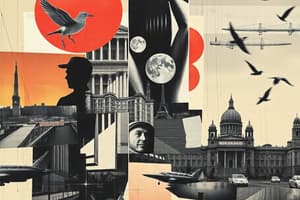Podcast
Questions and Answers
The primary role of the media is to sensationalize problems to attract audiences.
The primary role of the media is to sensationalize problems to attract audiences.
False (B)
Journalists should help reveal varied viewpoints and contradictions, even when it is uncomfortable.
Journalists should help reveal varied viewpoints and contradictions, even when it is uncomfortable.
True (A)
The media's role is solely to be a watchdog on government activities.
The media's role is solely to be a watchdog on government activities.
False (B)
Journalists should only represent loud and proactive stakeholders in their reporting.
Journalists should only represent loud and proactive stakeholders in their reporting.
Acknowledging the use of public funds by honest individuals is important in media reporting.
Acknowledging the use of public funds by honest individuals is important in media reporting.
Journalists should act as mediators between conflicting parties.
Journalists should act as mediators between conflicting parties.
A key responsibility of journalists is to promote myths and misconceptions.
A key responsibility of journalists is to promote myths and misconceptions.
Creating alliances with related interests is unnecessary for journalists.
Creating alliances with related interests is unnecessary for journalists.
Journalists primarily focus on the dissemination of information regarding current news and public affairs.
Journalists primarily focus on the dissemination of information regarding current news and public affairs.
Mass Communication exclusively pertains to journalism without encompassing PR or advertising.
Mass Communication exclusively pertains to journalism without encompassing PR or advertising.
Communicators and journalists are required to make balanced and democratic reports to ensure civic engagement.
Communicators and journalists are required to make balanced and democratic reports to ensure civic engagement.
A communicator is solely defined as a person who operates in television broadcasting.
A communicator is solely defined as a person who operates in television broadcasting.
Observing trends is an essential role for communicators and journalists.
Observing trends is an essential role for communicators and journalists.
The act of gathering information in journalism is referred to as communicating.
The act of gathering information in journalism is referred to as communicating.
Communicators include a diverse group of professionals such as scientists, educators, and businesspeople.
Communicators include a diverse group of professionals such as scientists, educators, and businesspeople.
The roles of communicators do not include observing trends in music or fashion.
The roles of communicators do not include observing trends in music or fashion.
Flashcards are hidden until you start studying
Study Notes
Communicators and Journalists
- Communicators encompasses a wide range of professionals in communication practice, such as journalists, advertisers, public relations officers, and more.
- They are united by their desire to send and receive messages aiming to impact their audience.
- Journalists gather information in various formats (text, audio, images), process it into newsworthy content, and disseminate it to the public.
- Journalism focuses on current news, public affairs, entertainment, sports, business, and more.
Roles of Communicators and Journalists
- Democratic, Substantive, and Balanced Reporting: Journalists should provide context and encourage civic engagement, ensuring accuracy and objectivity in their reporting.
- Observe Trends: Communicators must monitor trends in various domains like arts, fashion, music, and dance, even if they are secretive.
- Observe Issues and Impending Conflicts: Media acts as a watchdog for government actions and provides early warnings of potential conflicts, identifying stakeholders and available resources for conflict resolution.
- Be Balanced and Accurate in Addressing Issues: Media should not solely focus on negative aspects but also recognize and praise positive contributions to society, highlighting honest actions and ethical behavior.
- Bring Diverse Interests Together: Journalists should bring together all relevant stakeholders for problem-solving, giving voice to those who are less vocal.
- Reveal Contradictory and Illusory Facts and Viewpoints: Journalists must reveal contrasting viewpoints and potentially misleading information to provide comprehensive coverage.
- Help Clear Complexities: Communicators should clarify complex social issues confronting the public.
- Stimulate Dialogue in Issues: Journalists can act as mediators by promoting transparency between conflicting parties and providing an outlet for their emotions.
- Provide an Independent Voice: Journalists should maintain independence and objectivity in their reporting, ensuring public awareness of societal expectations and viewpoints.
- Address Misconceptions and Distinguish Myths: Journalists must discern facts from opinions and myths.
- Create Alliances with Others with Related Interests: Communicators and journalists should collaborate with organizations and individuals with similar interests to amplify their impact.
Studying That Suits You
Use AI to generate personalized quizzes and flashcards to suit your learning preferences.




